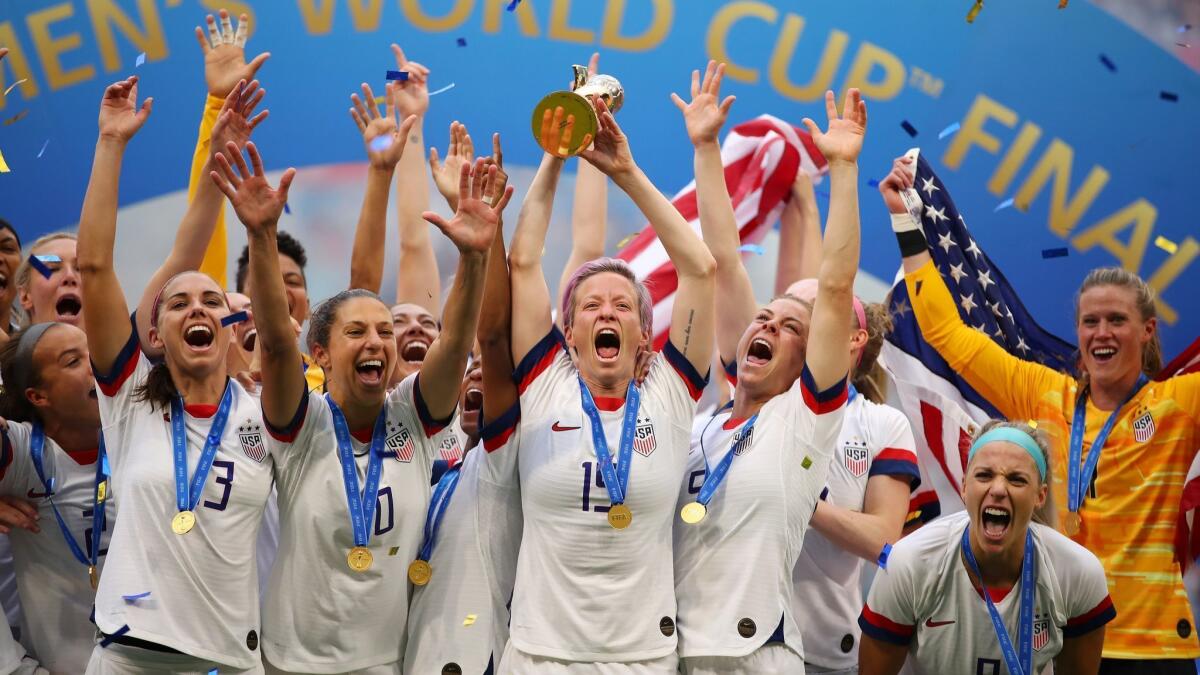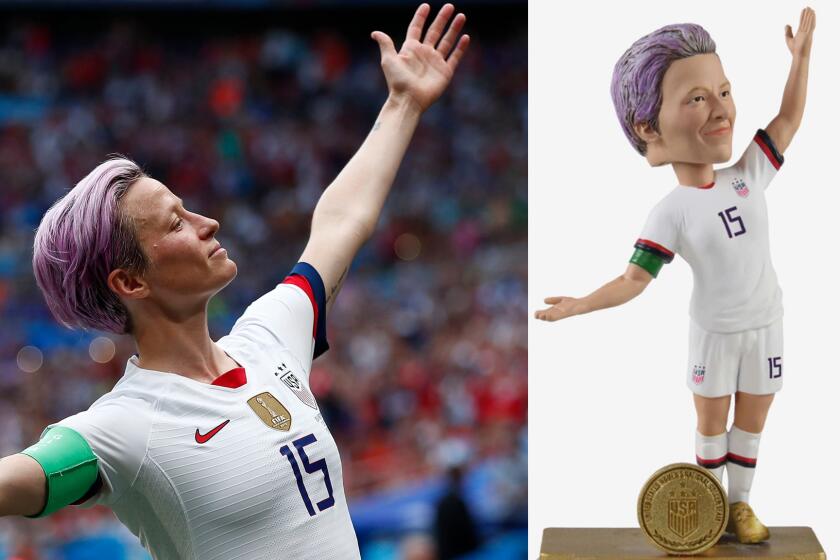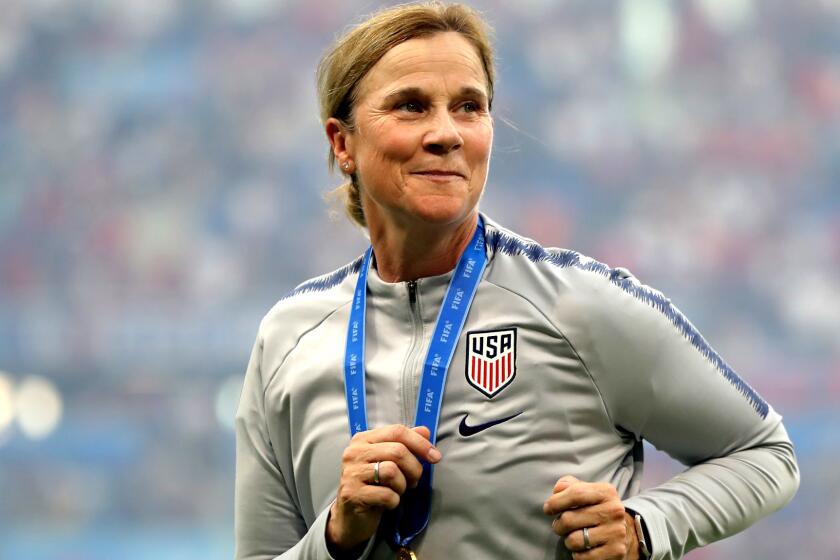U.S. women’s national team takes on Ireland at Rose Bowl as Victory Tour opens Saturday

- Share via
The last time the women’s national team was on a soccer field together the players were being showered with confetti after beating the Netherlands in the World Cup final in Lyon, France.
That was less than a month ago but a lot has happened since then. A fourth star, emblematic of the team’s four World Cup titles, was added to the U.S. jersey and Jill Ellis, the team’s coach, announced she was stepping down after five years and more than 100 wins.
Four players were named to the 12-woman shortlist for the FIFA world player of the year award and the struggling NWSL, the domestic league in which all 23 members of the national team play, was buoyed by a solid World Cup bump.
At the same time, however, the battle lines have hardened over the pay-equity lawsuit the players have filed against their federation, with the two sides renewing their rhetorical sparring after an uneasy World Cup truce.
It will be against that backdrop of both growth and uncertainty that the U.S. women will reunite Saturday at the Rose Bowl for their first game since the World Cup final, kicking off a five-game Victory Tour against Ireland. A crowd of more than 35,000 is expected although World Cup heroes Alex Morgan and Megan Rapinoe will not play due to injury.
The World Cup afterglow has provided new life for the NWSL, a nine-team league heavily subsidized by U.S. Soccer and reliant on the national team for its best players. A crowd of 22,320, the second-largest crowd in league history, welcomed the Portland Thorns’ four U.S. World Cup players back last week; a week earlier the Chicago Red Stars drew a club-record 17,388, four times their 2018 average.
The U.S. women’s soccer team negotiated for control of the rights to their names and likenesses in 2015, a move that followed the NFL players’ union blueprint.
There’s been growth off the field too: In the days before the World Cup final, ESPN announced it would broadcast 14 NWSL games this season while Budweiser signed a multiyear sponsorship deal and this week Nike extended its deal with the league through 2022.
The league got a similar bump from the last U.S. World Cup win four years ago, with attendance increasing 22% and Fox Sports signing on to televise the games. But interest plummeted two years later and Fox moved on – as did four of the league’s eight original teams, who have changed locations or ownership groups since 2017.
Maintaining that interest this time could be key to both the national team’s continued success and the league’s survival, especially with several teams in Europe, flush with new sponsorship dollars of their own, poised to raid the NWSL for players such as Julie Ertz, Rose Lavelle, Rapinoe and Morgan, all of whom were nominated for FIFA’s best player award.
“I do think a healthy concern about the viability of NWSL is appropriate despite the positive news lately,” said Steven A. Bank, a professor of business law at UCLA and an expert on soccer law issues. “On the revenue side, the ESPN deal is only through the rest of this season. Increases in ticket sales seem uneven across the league and it’s not clear whether they are sustainable beyond the immediate post-World Cup glow.
“Interest in women’s soccer is gradually growing. Nevertheless, the league’s foundation is not entirely stable. The ownership groups do not seem similarly committed or well-resourced, across the league. As Megan Rapinoe noted, the league needs billionaires rather than millionaires.”
Ellis, 52, one of the league’s biggest backers, has agreed to coach the national team during its Victory Tour but not beyond after her contract with U.S. Soccer expired last Wednesday,
“When I accepted the head coaching position this was the timeframe I envisioned,” said Ellis, who took over in May 2014. “It just felt right. I’m just in a really good place with this decision.”
Jill Ellis as coach led the U.S. women’s soccer team to a pair of World Cup championships and a national-record 127 games.
She leaves with a 102-7-18 record and two World Cup titles in a U.S.-best 127 games. And if she wins four of the five Victory Tour games, she’ll break Tony DiCicco’s record of 105 coaching wins as well.
But she also leaves at a critical time for the national team with the Tokyo Olympics less than a year away.
Carlos Cordeiro, president of U.S. Soccer, is expected to hire a general manager for the women’s program shortly. That person will play a big role in selecting Ellis’ successor from a short list that includes Amanda Cromwell, a former national team player who led UCLA to an NCAA title, something Ellis never did in 11 years at the school; Penn State’s Erica Dambach, part of the national team staff at the 2008 Olympics and 2011 World Cup; and Laura Harvey of the Utah Royals who, like Ellis, was born in England and led Arsenal’s women’s team to four titles before moving to the NWSL.
Which way Cordeiro is leaning is unknown since he has declined to speak on the record this week, issuing a three-sentence statement as part of a U.S. Soccer news release announcing Ellis’ decision to step down. He has been equally silent, if more verbose, on the legal fight between the players and the federation, releasing a two-page letter and three-page fact sheet in which U.S. Soccer says it actually paid the women’s team more than the men -- $34.1 million to $26.4 million – between 2010-2018.
The women are suing their federation, alleging players on the men’s national team receive more in bonuses and game-day pay than the women do for equal work.
The latest figures, Cordeiro said, are based on an “extensive” analysis of IRS filings, financial statements including W-2 forms and player payrolls. The numbers include NWSL salaries of as much as $172,500 per player that U.S. Soccer pays to members of the women’s team, in addition to other benefits negotiated in the most recent collective bargaining agreement. Men’s national team players receive no salary from U.S. Soccer since they are paid by their clubs.
The federation also said the men’s team brought in more revenue between 2009 and 2019, generating $185.7 million over 191 games while the women made $101.3 million over 238 games
Molly Levinson, a spokeswoman for the players, called the letter “a sad attempt by USSF to quell the overwhelming tide of support the USWNT has received from everyone from fans to sponsors to the United States Congress.”
More to Read
Go beyond the scoreboard
Get the latest on L.A.'s teams in the daily Sports Report newsletter.
You may occasionally receive promotional content from the Los Angeles Times.









